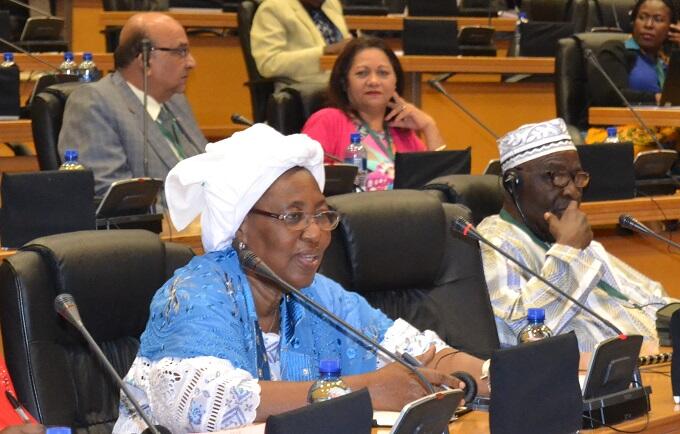16 September 2017 – Midrand (Johannesburg), South Africa: The Pan African Parliament convened for the 10 occasion its annual Conference on Women from 12 to 13 October 2017 under the theme “Role of Parliamentarians in promoting international and regional Human Rights instruments, especially those related to Women and Youth, Peace and Security, and Female Genital Mutilation in order to achieve the Demographic Dividend”. The convening drew wide engagement from the Regional Economic Communities, including ECOWAS, EAC and IGAD; and civil society organisations from across the continent.
Noting the high female genital mutilation prevalence levels in Africa, particularly in countries across the Sahel, the Pan African Parliament (PAP) Members of Parliament reaffirmed the call to implement regional human rights instruments, including the African Charter on the Rights and Welfare of the Child – 1990; the African Charter on Human and People’s Rights – 1981, and its Protocol related to the Rights of Women in Africa, the Maputo Protocol – 2003.
Following on the heels of a FGM Medicalisation High Level Meeting in Sharm el Sheikh, Egypt in September 2017 – where regional medical institutions and organisations made declarations and pronouncements to end FGM Medicalisation – the PAP conference having examined the issue further called on the medical fraternity and relevant authorities to ensure the highest standards and ethics, and a complete end to the practice among health providers.
Speaking to women’s empowerment and participation in peace building efforts, the PAP conference observed with concern the risk for gender based violence young girls and women face in conflict situations including rape and forced marriages. They noted that insecurities fuel gender disparities and further diminish girls and women’s health and wellbeing, and called on member states to recommit and implement regional human rights instruments (including the Maputo Protocol – 2003) through wide-scale domestication.
According to UNICEF, Africa can save up to 3.9 million girls from female genital mutilation and reduce the number of those cut from over 14 million to just over 10 million by 2020. This scenario can be achieved if key countries including Djibouti, Egypt, Guinea-Bissau, Mauritania, Mali and Nigeria can accelerate actions on ending FGM.
Speaking at the opening among others, the UNFPA East and Southern Africa Regional Office Deputy Director noted that more than 200 million women worldwide have experienced female genital mutilation and 3 million are at risk annually to be cut.
Summary of Recommendations from the PAP 10th Women’s Conference Outcome Document
- African Union Heads of State and Government Summit to make explicit commitments towards ending harmful practices within the spectrum of the 2030 Agenda on Sustainable Development and Agenda 2063;
- African Union Member States to take deliberate actions to protect women, young girls and young people, and ensure the abandonment of all harmful practices;
- African Union Member States to adopt and dedicate a special campaign towards ending female genital mutilation;
- Members of Parliaments commit to hold Governments’ accountable to report on progress done on International and Regional Human Rights implementation, especially those related to women and girls rights and against harmful practices such as FGM.
- Medical fraternity encouraged to ensure the highest ethical standards and measures in place to address medicalisation of female genital mutilation;
- African Union Member States, Regional Economic Communities (RECs) and stakeholders promote engaging men and boys in addressing gender inequalities, gender based violence and changing social norms perpetuating harmful practices;
- 38 African Union Member States that have ratified the AU Women’s Protocol to domesticate and implement the protocol and those who have yet to ratify the Protocol to take urgent action towards ratification and domestication.
UNFPA is engaging with the African Union Commission (AUC) and Member States to galvanize political commitment to eliminate female genital mutilation in Africa through the Accelerating Change; UNFPA – UNICEF Joint Programme on FGM. The programme was first launched in 2008 and focuses on 16 African countries (Burkina Faso, Djibouti, Uganda, Egypt, Ethiopia, Eritrea, Gambia, Guinea, Guinea-Bissau, Kenya, Mali, Mauritania, Nigeria, Senegal, Sudan and Somalia). UNFPA provided technical support to the PAP Women’s Conference to bring further attention to female genital mutilation as part of different perspectives, including FGM medicalization, demographic dividend and, boys and male engagement.



